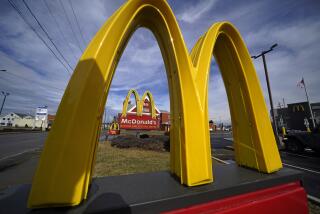Wal-Mart Posts 14% Profit Rise
- Share via
Wal-Mart Stores Inc., the world’s largest retailer, said Tuesday that first-quarter profit rose 14%, bolstered by cost cutting and a falling dollar. Sales increased at the slowest pace in more than a decade.
Net income fell 29% at J.C. Penney Co., the second-biggest U.S. department store company. A tax credit increased profit 2.7% at May Department Stores Co., which operates Robinson-May. Sales declined at both chains.
Consumers restrained spending as U.S. unemployment reached an eight-year high and snowstorms kept shoppers home. Discounter Wal-Mart was able to reduce expenses by buying more merchandise directly. The economic slowdown hurt department store chains more. That may lead to profit-eroding price cuts, analysts said.
“You just have to be discount or else you’re getting killed,” said Wayne Bopp, an analyst at Fifth Third Bancorp.
Retailers are expected to report the smallest quarterly profit gain in 18 months.
First-quarter profits probably increased 3.2%, according to a Thomson Financial survey of analysts’ estimates for 137 retailers. That’s down from 26% a year earlier and is the lowest since the third quarter of 2001, when retailers were coping with the aftereffects of the Sept. 11 terrorist attacks, said Ken Perkins, a Thomson analyst.
Shares of Wal-Mart fell $1.21 to $55.49 on the New York Stock Exchange. May dropped 42 cents to $22.17 and J.C. Penney gained 96 cents to $18.85.
Bentonville, Ark.-based Wal-Mart earned $1.86 billion, or 42 cents a share, in the quarter ended April 30, compared with $1.63 billion, or 37 cents, in the year-ago period. Sales rose 9.7% to $56.72 billion.
J.C. Penney said profit dropped because of lower sales at its department stores and at its Eckerd drugstore chain. Net income fell to $61 million, or 20 cents a share, from $86 million, or 29 cents, a year earlier. Sales declined 3% to $7.49 billion in the three months ended April 26.
May’s net income in the quarter ended May 3 rose to $72 million, or 23 cents a share, from $70 million, or 23 cents, a year earlier. Sales declined 7.2% to $2.9 billion.
Profit would have dropped for the ninth straight quarter without a tax credit of $31 million, or 10 cents a share, for resolving state and federal income tax issues.
May and other department stores have had to reduce prices to lure shoppers, who are concerned about job cuts and have turned to lower-price chains outside malls such as Kohl’s Corp., analysts said.
May also has cut jobs and combined some divisions.
More to Read
Inside the business of entertainment
The Wide Shot brings you news, analysis and insights on everything from streaming wars to production — and what it all means for the future.
You may occasionally receive promotional content from the Los Angeles Times.










